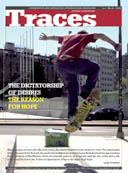
Traces N.6, June 2005
The Energy of the IdealAn oft-used adage says, “When the going gets tough, the tough get going.” Many indicators published these days in the press assert that Italy and, more in general, Europe, are heading for an even more difficult period, particularly economically. The repercussions in the lives of normal people are already being felt, and probably will worsen. So, the going is getting tough. And we are already seeing how the tough get going, in many behaviors and in some elections, with protests and impatience, which are often exacerbated and exploited (for example, in the recent administrative elections in Italy, and the motivations for the victorious “no” in the French referendum on the EU charter).
When things worsen, it seems inevitable that, on a personal and collective level, complaining and protest begin to dominate. There are a thousand good reasons to protest. But are we sure that “getting going” when the going gets tough means reacting in protest or complaining passively? Is unleashed anger how you “get going”? Isn’t it instead something much more solid, much more active inasmuch as it’s constructive, capable of providing endurance and new drive?
“Desire” is the aspect of the human soul that truly gets us going. With desire as the foundation, you can truly build, even in the midst of situations that impose drastic changes and demand a break from business as usual. In order not to be reduced to vague aspiration, desire must seek an ideal, something to measure itself against, an image and realization of the good that is sought.
We need desire, and an ideal that sustains it, so life won’t be dominated by desperation, weariness, or the arid measures of business and the struggle for the particular. Based on the tenacity of this desire, and the endurance of this ideal, it is possible today to start again, unafraid of the difficulties, looking with realism at the things to change and those not to throw away.
The climate these days threatens to darken everything and everybody. Maybe the privileged will escape the difficulties that are on the way, but most people will feel their bite. If feelings of division and envy, if obstinate hatefulness in the defense of the particular are not to prevail, then we need men at work, according to their own responsibility, and above all with a great desire for their own good and that of their children, people sustained by a present ideal they can experience. This will give energy instead of poison, and constructiveness instead of sterile protest. There are examples, numerous ones. There are models of vindication, to follow and imitate.